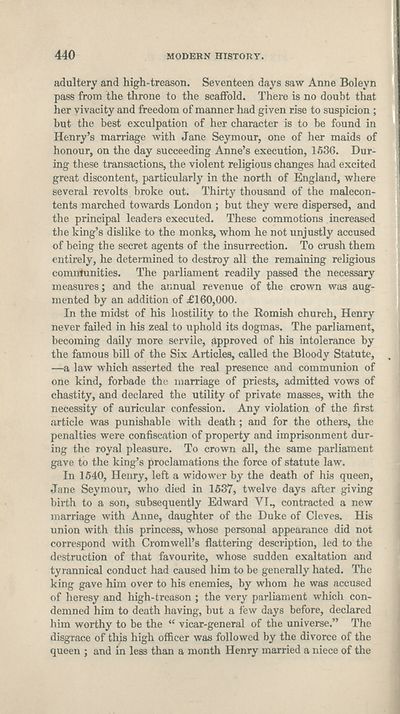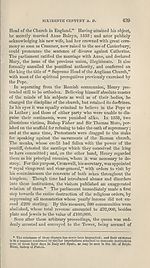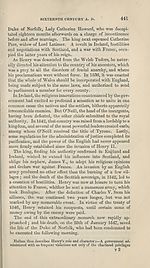Download files
Complete book:
Individual page:
Thumbnail gallery: Grid view | List view

440
MODERN HISTORY.
adultery and high-treason. Seventeen days saw Anne Boleyn
pass from the throne to the scaffold. There is no doubt that
her vivacity and freedom of manner had given rise to suspicion ;
but the best exculpation of her character is to be found in
Henry’s marriage with Jane Seymour, one of her maids of
honour, on the day succeeding Anne’s execution, 1536. Dur¬
ing these transactions, the violent religious changes had excited
great discontent, particularly in the north of England, where
several revolts broke out. Thirty thousand of the malecon-
tents marched towards London ; but they were dispersed, and
the principal leaders executed. These commotions increased
the king’s dislike to the monks, whom he not unjustly accused
of being the secret agents of the insurrection. To crush them
entirely, he determined to destroy all the remaining religious
comnlunities. The parliament readily passed the necessary
measures; and the annual revenue of the crown was aug¬
mented by an addition of £160,000.
In the midst of his hostility to the Romish church, Henry
never failed in his zeal to uphold its dogmas. The parliament,
becoming daily more servile, approved of his intolerance by
the famous bill of the Six Articles, called the Bloody Statute,
—a law which asserted the real presence and communion of
one kind, forbade the marriage of priests, admitted vows of
chastity, and declared the utility of private masses, with the
necessity of auricular confession. Any violation of the first
article was punishable with death; and for the others, the
penalties were confiscation of property and imprisonment dur¬
ing the royal pleasure. To crown all, the same parliament
gave to the king’s proclamations the force of statute law.
In 1540, Henry, left a widower by the death of his queen,
Jane Seymour, who died in 1537, twelve days after giving
birth to a son, subsequently Edward VT., contracted a new
marriage with Anne, daughter of the Duke of Cleves. His
union with this princess, whose personal appearance did not
correspond with Cromwell’s flattering description, led to the
destruction of that favourite, whose sudden exaltation and
tyrannical conduct had caused him to be generally hated. The
king gave him over to his enemies, by whom he was accused
of heresy and high-treason ; the very parliament which con¬
demned him to death having, but a few days before, declared
him worthy to be the “ vicar-general of the universe.” The
disgrace of this high officer was followed by the divorce of the
queen ; and in less than a month Henry married a niece of the
MODERN HISTORY.
adultery and high-treason. Seventeen days saw Anne Boleyn
pass from the throne to the scaffold. There is no doubt that
her vivacity and freedom of manner had given rise to suspicion ;
but the best exculpation of her character is to be found in
Henry’s marriage with Jane Seymour, one of her maids of
honour, on the day succeeding Anne’s execution, 1536. Dur¬
ing these transactions, the violent religious changes had excited
great discontent, particularly in the north of England, where
several revolts broke out. Thirty thousand of the malecon-
tents marched towards London ; but they were dispersed, and
the principal leaders executed. These commotions increased
the king’s dislike to the monks, whom he not unjustly accused
of being the secret agents of the insurrection. To crush them
entirely, he determined to destroy all the remaining religious
comnlunities. The parliament readily passed the necessary
measures; and the annual revenue of the crown was aug¬
mented by an addition of £160,000.
In the midst of his hostility to the Romish church, Henry
never failed in his zeal to uphold its dogmas. The parliament,
becoming daily more servile, approved of his intolerance by
the famous bill of the Six Articles, called the Bloody Statute,
—a law which asserted the real presence and communion of
one kind, forbade the marriage of priests, admitted vows of
chastity, and declared the utility of private masses, with the
necessity of auricular confession. Any violation of the first
article was punishable with death; and for the others, the
penalties were confiscation of property and imprisonment dur¬
ing the royal pleasure. To crown all, the same parliament
gave to the king’s proclamations the force of statute law.
In 1540, Henry, left a widower by the death of his queen,
Jane Seymour, who died in 1537, twelve days after giving
birth to a son, subsequently Edward VT., contracted a new
marriage with Anne, daughter of the Duke of Cleves. His
union with this princess, whose personal appearance did not
correspond with Cromwell’s flattering description, led to the
destruction of that favourite, whose sudden exaltation and
tyrannical conduct had caused him to be generally hated. The
king gave him over to his enemies, by whom he was accused
of heresy and high-treason ; the very parliament which con¬
demned him to death having, but a few days before, declared
him worthy to be the “ vicar-general of the universe.” The
disgrace of this high officer was followed by the divorce of the
queen ; and in less than a month Henry married a niece of the
Set display mode to:
![]() Universal Viewer |
Universal Viewer | ![]() Mirador |
Large image | Transcription
Mirador |
Large image | Transcription
| Antiquarian books of Scotland > Education > Elements of universal history on a new and systematic plan > (460) |
|---|
| Permanent URL | https://digital.nls.uk/127585660 |
|---|
| Description | Thousands of printed books from the Antiquarian Books of Scotland collection which dates from 1641 to the 1980s. The collection consists of 14,800 books which were published in Scotland or have a Scottish connection, e.g. through the author, printer or owner. Subjects covered include sport, education, diseases, adventure, occupations, Jacobites, politics and religion. Among the 29 languages represented are English, Gaelic, Italian, French, Russian and Swedish. |
|---|

